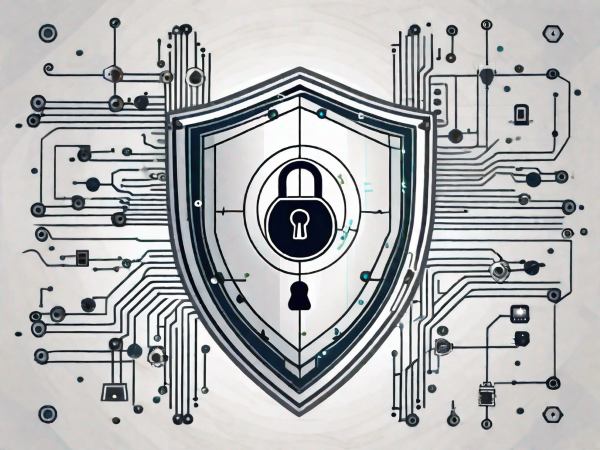The Ultimate Guide to Cybersecurity Careers
12 Dec, 20235
Contents
- Understanding the Cybersecurity Landscape
- The Evolution of Cyber Threats
- Key Cybersecurity Concepts and Terminology
- The Importance of Cybersecurity in Today's World
- Cybersecurity Career Pathways
- Entry-Level Roles and Progression
- Specialised Cybersecurity Domains
- Leadership Positions in Cybersecurity
- Educational Requirements for Cybersecurity Professionals
- Degrees and Certifications
- Self-Learning and Online Resources
- The Role of Continuous Education in Cybersecurity
- Essential Skills for a Successful Cybersecurity Career
- Technical Skills and Expertise
- Soft Skills and Communication
- Problem-Solving and Analytical Thinking
Welcome to the ultimate guide to cybersecurity careers. In this comprehensive overview, we'll explore the dynamic landscape of cybersecurity, the diverse career pathways available, the educational requirements for aspiring professionals, and the essential skills needed to succeed in this fast-paced field. Whether you're just entering the workforce, exploring a career change, or looking to advance within the cybersecurity industry, this guide will provide valuable insights and guidance to help you navigate the exciting world of cybersecurity careers.
Understanding the Cybersecurity Landscape
As technology continues to advance at a rapid pace, the evolution of cyber threats has become increasingly complex and sophisticated. From traditional malware and phishing attacks to advanced persistent threats and nation-state cyber espionage, the cybersecurity landscape is constantly evolving. Understanding the ever-changing nature of cyber threats is crucial for professionals in this field.
Key cybersecurity concepts and terminology play a vital role in developing a strong foundation in the field. Concepts such as encryption, authentication, and access control, along with terms like penetration testing, threat intelligence, and incident response, form the building blocks of cybersecurity knowledge and expertise.
The importance of cybersecurity in today's world cannot be overstated. With the rise of digital transformation and the increasing interconnectivity of devices and systems, the need for robust cybersecurity measures has never been greater. Cybersecurity professionals play a critical role in safeguarding sensitive data, protecting digital assets, and ensuring the integrity of information infrastructure.
One of the key aspects of cybersecurity is encryption. Encryption is the process of converting plain text into unreadable ciphertext, ensuring that only authorised individuals can access the information. It provides a secure way of transmitting and storing sensitive data, making it an essential component of any cybersecurity strategy.
Authentication is another crucial concept in cybersecurity. It involves verifying the identity of individuals or devices attempting to access a system or network. This can be done through various methods such as passwords, biometrics, or digital certificates. By implementing strong authentication mechanisms, organisations can prevent unauthorised access and protect their valuable resources.
Access control is closely related to authentication and refers to the practice of granting or denying access to specific resources based on predefined rules. It ensures that only authorised individuals or entities can access sensitive information or perform certain actions within a system. By implementing robust access control measures, organisations can minimise the risk of unauthorised access and potential data breaches.
Penetration testing, also known as ethical hacking, is a proactive approach to cybersecurity. It involves simulating real-world attacks on a system or network to identify vulnerabilities and weaknesses. By conducting regular penetration tests, organisations can identify and address potential security flaws before malicious actors exploit them.
Threat intelligence is an essential component of any cybersecurity strategy. It involves gathering and analysing information about potential threats and adversaries. By staying informed about the latest cyber threats and trends, organizations can proactively defend against potential attacks and mitigate risks.
Incident response is the process of handling and managing cybersecurity incidents. It involves detecting, analysing, and responding to security breaches or incidents in a timely and effective manner. A well-defined incident response plan is crucial for minimising the impact of a security incident and restoring normal operations as quickly as possible.
The role of cybersecurity professionals is becoming increasingly important in today's digital landscape. They are responsible for designing, implementing, and maintaining robust cybersecurity measures to protect organisations from cyber threats. They play a critical role in safeguarding sensitive data, ensuring the confidentiality, integrity, and availability of information, and maintaining the trust of customers and stakeholders.
Cybersecurity Career Pathways
Embarking on a cybersecurity career presents a wide array of pathways and opportunities for professionals at various stages of their careers. Whether you are just starting out or looking to advance your existing cybersecurity skills, the field offers a multitude of options to explore and grow.
Entry-level roles provide a solid foundation for aspiring cybersecurity professionals. These positions often involve tasks such as monitoring and analysing security systems, conducting vulnerability assessments, and assisting with incident response. By working in these roles, individuals gain hands-on experience and develop a strong understanding of the fundamentals of cybersecurity.
As professionals gain experience and expertise, they can explore specialised cybersecurity domains that align with their interests and strengths. One such domain is ethical hacking, also known as penetration testing. Ethical hackers are responsible for identifying vulnerabilities in an organisation's systems and networks, simulating real-world attacks to help improve security measures. This role requires a deep understanding of various hacking techniques and the ability to think like a malicious actor.
Another specialised domain is incident response. In this role, professionals are responsible for managing and mitigating the impact of security incidents. They investigate and analyse security breaches, develop incident response plans, and coordinate with various stakeholders to ensure a swift and effective response. Incident response professionals need to have strong analytical and problem-solving skills, as well as the ability to work well under pressure.
Cloud security is another rapidly growing domain within cybersecurity which can offer businesses huge benefits. With the increasing adoption of cloud computing, organisations need professionals who can ensure the security of their cloud-based systems and data. Cloud security specialists are responsible for implementing and maintaining security controls, conducting risk assessments, and ensuring compliance with industry regulations. This role requires a solid understanding of cloud architecture, as well as knowledge of various cloud security frameworks and technologies.
For those who aspire to leadership positions in cybersecurity, there are opportunities to take on roles such as Chief Information Security Officer (CISO) or cybersecurity consultant. These positions involve overseeing an organisation's overall security strategy, managing teams, and influencing strategic cybersecurity initiatives. CISOs play a crucial role in driving organisational resilience and ensuring that security measures align with business objectives. Cybersecurity consultants, on the other hand, work with multiple clients to assess their security posture, develop customised solutions, and provide guidance on best practices.
In conclusion, the field of cybersecurity offers a vast range of career pathways and opportunities for professionals at all levels. Whether you are interested in starting at an entry-level position, specialising in a specific domain, or aiming for a leadership role, there is no shortage of options to explore. With the ever-evolving nature of cyber threats, the demand for skilled cybersecurity professionals continues to grow, making it an exciting and rewarding field to pursue.
Educational Requirements for Cybersecurity Professionals
In the realm of educational requirements, cybersecurity professionals have a variety of options to pursue. Traditional degrees in computer science, information technology, or cybersecurity provide a solid academic foundation. These programs typically cover a wide range of topics, including network security, cryptography, secure coding, and incident response. Students also have the opportunity to gain hands-on experience through internships and cooperative education programs, allowing them to apply their knowledge in real-world scenarios.
However, formal education is not the only path to becoming a cybersecurity professional. In addition to traditional degrees, industry-recognised certifications such as Certified Information Systems Security Professional (CISSP) and Certified Ethical Hacker (CEH) are highly valued in the cybersecurity community. These certifications demonstrate a candidate's expertise in specific areas of cybersecurity and can greatly enhance their career prospects.
Self-learning and online resources offer flexible pathways for individuals to acquire knowledge and skills in cybersecurity. With a wealth of training materials, virtual labs, and interactive platforms available, aspiring professionals can supplement their formal education or even learn independently. Online courses and tutorials provide the convenience of learning at one's own pace, allowing individuals to balance their studies with other commitments.
Continuous education is instrumental in staying abreast of emerging threats and technologies in the cybersecurity domain, making ongoing learning a lifelong commitment for professionals in this field. Cybersecurity professionals often attend conferences, workshops, and webinars to expand their knowledge and network with industry experts. These events provide valuable opportunities to learn about the latest trends, tools, and best practices in cybersecurity.
Furthermore, joining professional organisations and participating in community forums can also contribute to a cybersecurity professional's growth. These platforms allow individuals to engage in discussions, share insights, and collaborate with peers. By actively participating in the cybersecurity community, professionals can stay connected with the latest developments and build a strong professional network.
In conclusion, the educational requirements for cybersecurity professionals are diverse and offer multiple pathways to enter the field. Whether through traditional degrees, industry certifications, self-learning, or active participation in the cybersecurity community, individuals can acquire the necessary knowledge and skills to succeed in this dynamic and ever-evolving industry.
Essential Skills for a Successful Cybersecurity Career
Technical skills and expertise form the bedrock of a successful cybersecurity career. Proficiency in areas such as network security, cryptography, and vulnerability assessment equips professionals with the tools to mitigate cyber risks and fortify digital defenses.
Soft skills and communication are equally vital, enabling cybersecurity professionals to effectively collaborate with cross-functional teams, articulate complex security issues to non-technical stakeholders, and drive a culture of security awareness within organisations. Problem-solving and analytical thinking are essential traits that empower professionals to dissect intricate security challenges and devise innovative solutions.
The field of cybersecurity presents a dynamic and multifaceted landscape with abundant opportunities for individuals passionate about technology and committed to safeguarding digital assets. If you're ready to chart a rewarding and impactful career in cybersecurity—whether defending against evolving cyber threats, unraveling intricate security puzzles, or shaping strategic cybersecurity initiatives—reach out to us today. Let us guide you on your journey, providing insights and connections to help you make your mark in this vital and ever-evolving field. Your cybersecurity career awaits, and we're here to support your success!



